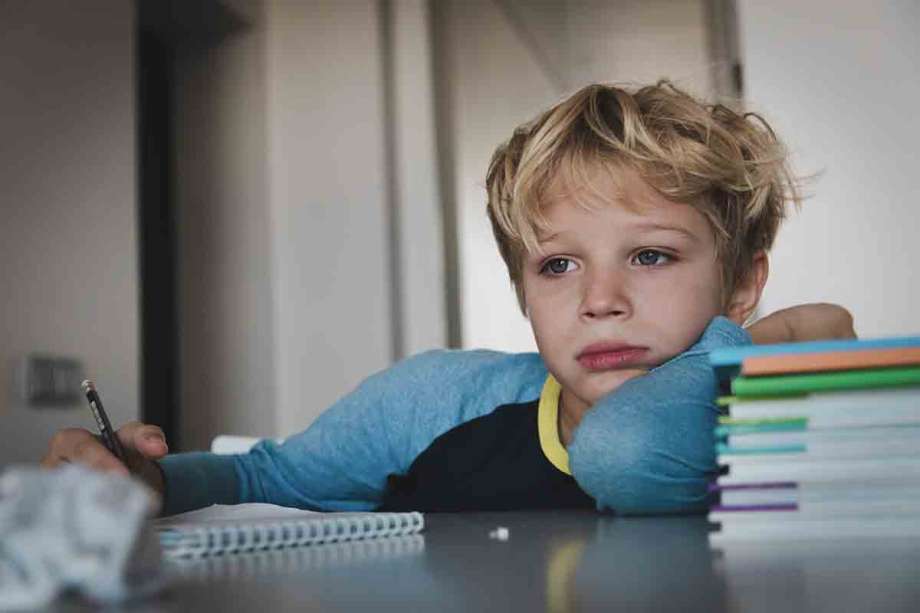How to Help Your Child Cope With Back to School Anxiety

Mental health has come to the forefront of our culture, and that’s a good thing. More and more people, celebrities, athletes, and politicians are speaking out about their personal struggles with mental health, thus shining a light on anxiety disorders and depression.
More: Talking to Children about Their School Anxiety
It is pretty common for young children to experience some level of separation anxiety when they first go off to school, particularly if they have been home with a parent until the start of Kindergarten.
The coronavirus pandemic added a new type of anxiety; not only were kids home even more than usual with their parents, but the fear of becoming ill is present. When school starts across this country, many children will be back in buildings full-time for the first time in over a year.
As a parent, you may be wondering how you can help your child process any anxiety or fears about returning to school. Compiled in this article are tips and strategies from experts designed to make back-to-school drop-off and first-day jitters a little bit easier to handle for both you and your child.
Confidence is Key
Fake it ‘til you make it, as they say. Kids often feed off of their parent’s anxieties and worries, so if you are openly exhibiting worry and fear about them going back to school, they will feel that and mimic it. Showcase confidence and excitement that school will be starting again soon!
Confidence is especially important if this is your child’s first year at school or they are starting at a new school. Build your child up with meaningful, specific compliments to boost their confidence for the start of the year; a boosted self-esteem creates confidence in themselves and their abilities.
Talk about how much fun school will be and all the exciting things they will be doing when they go, and share some of your positive memories about school.
Talk About Their Feelings
One of the best things you can do for your child’s well-being is openly discuss feelings. Throughout the coronavirus lockdown, mental health professionals and pediatricians emphasized the importance of helping children process and cope with their feelings.
Not all children know how to put a name to what they are experiencing. Pay attention to cues and signals that your child might be anxious such as withdrawal, stomachaches, headaches, a change in eating habits, a change in bathroom habits, mood swings, or tantrums.
Younger children may need you to name feelings for them, for example, “You’ve been very quiet today, is there something you are feeling anxious or nervous about?” or “You don’t seem like yourself today, and I heard you slam your door; is something making you angry?”
Children who can discuss and express their feelings develop more advanced social skills, perform better on their school work, are more confident and are more empathetic.
Visit the School
If your child is transitioning to a new school or you have moved, call the school to see if you can set up a visit ahead of time. Many schools host a meet & greet each year where students can visit, meet their teacher, and bring in their school supplies.
Even if your child has been going to the school for a few years, taking them to see their new classroom and meet their new teacher is fun and exciting, and it will stir up some enthusiasm about the start of a new school year.
Have a First Week Plan
Have a back-to-school routine planned for the first week back to school. Discuss with your child ahead of time what the first week back to school is going to look like, and pay attention to any anxiety or stress your child is having about that first few days.
You may wish to practice the routine ahead of time so that the first day isn’t a mad rush to make it to the school bus on time. Coming off a summer of playdates and free time is difficult for children, and let’s be honest, the change in routine is tough on us too!
The more something is practiced, talked about, and prepared for, the better one feels, so don’t be afraid to start early!
Create a Drop-off Routine
Whether it is preschool or high school, the first day of school causes anxiety for many children. One of the best ways to help anxious preschool and elementary school-aged children through the transition is to create a drop-off routine.
As a preschool teacher, I recommended this to many parents and even developed one with my younger son. There are a few basic components to a drop-off routine that educators recommend.
- Consistency
- Short and Sweet
- Do NOT come back after saying goodbye
- Expect Crying
- A transition object (if needed)
Consistency
Children crave consistency, so provide it as part of the drop-off routine. When children know what to expect, there will be less anxiety. Discuss with your child what the routine should consist of; it could be a high five and a kiss, or it could be a hug and you waving as they drive away on the bus. Plan it together, and then stick to it daily.
Short and Sweet
Keep the routine with your child short and sweet. Prolonged goodbyes are much more challenging because your child will continue to crave more. If your child tries to get one more hug or kiss, remind them of the routine, “We said three kisses, and then daddy leaves. I gave you your three kisses, so now it’s time for you to walk into the building. I’ll see you after school!”
Do NOT Go Back
This is a tough one for sure, especially if we hear our kids crying or they were clinging to us as we left. But the simple fact is, when you go back, you reinforce to your child that tantrums and crying make you stay. If you feel anxious and upset, call the school or child care about 5 minutes after leaving. In most instances, your child will already be engaged in the day and calmed down.
Expect Crying
If you already know your child is feeling anxious, expect crying. If there is none, excellent, but if you are prepared for it, you’ll be able to handle it better. Teachers and caregivers are skilled at helping children calm down when they experience separation anxiety, so trust that they will do their job. Maybe you’re going to cry too, and that’s OK! Just don’t let your kid see you cry; you must appear happy and confident so that the confidence transfers to your child. Then, once you’re in your car, you can let the tears flow!
Use a Transition Object
Some children will benefit from a transition object. It could be a small stuffed animal they keep in their backpack or a picture of their parents, siblings, or favorite family member. Sometimes just knowing they have that object close is enough to get over the jitters.
Go Back to School Shopping
Few things are more exciting than back-to-school shopping. I remember picking out my Trapper-keeper and decorating it with Lisa Frank stickers, oh the 90s, and while style has sure changed, many kids still enjoy that back-to-school shopping trip.
Additionally, back-to-school shopping can help build up that excitement in kids as they pick out new things for the year. It also provides you an opportunity to talk about how great school will be this year and feel out if your child has any worries or anxieties in a fun, stress-free environment.
COVID Concerns
The return to school in 2021 has a new set of fears and worries kids never had to face before. To help your child prep for the new school year, here are a few COVID specific tips:
- Discuss and practice handwashing and good hygiene
- Talk about wearing a mask and practice if your child has not worn one much
- Discuss any fears or concerns they may have
- Talk about how exciting it will be to return to school and see friends
- Set up a playdate with a familiar classmate
- Ask them what they are looking forward to at school
- Avoid expressing your worries and concerns to your child
- Visit the school
- Practice spending time away from your children
Whether this is your child’s first time going to school or their final year of high school, everyone experiences anxiety from time to time. The key is to stay confident and excited about the upcoming school year and provide a loving, safe space for your child to discuss any worries they are experiencing. Ease some of the anxiety with a Back to School Checklist.

